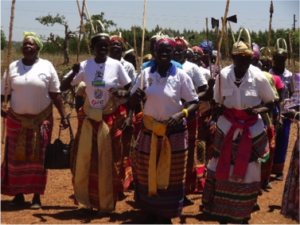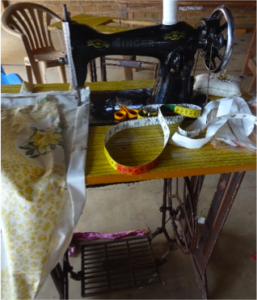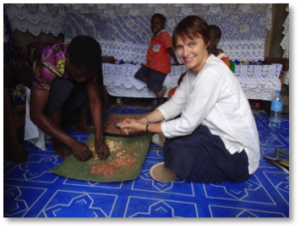Last year Di McCann, mother of Sophie, N4A Executive Director, travelled with N4A founder Becky Tinsley to Kenya, Rwanda and Uganda. This blog is about her visit to our projects in Rwanda. Click here to read more about her time on safari in Kenya and here to learn about her visit to our projects in Rwanda.
.
Another short hop and we were soon at the Entebbe Airport Hotel, a sort of Best Exotic Hibiscus Hotel, very comfortable with candle-lit dinner in the garden, the scent of gardenia floating on the breeze and mosquitoes drilling into our ankles. It was a short stroll from a busy market street buzzing with mopeds and motorbikes tearing around corners at breakneck speed, where we changed some money and stocked up on fruit and nut supplies for our week in Patongo. Overnight Annabel, Network for Africa CEO arrived and early next morning we three set off on the last leg of my great adventure, on  a 12-seater single-engine plane to Patongo, about 300 km north as the crow would fly. But to my absolute joy, as I love small plane flights and wanted to see as much as possible from the air, we zigzagged our way over the vast Victoria Nile Lakes system, over huge, jagged escapements jutting up from the endless plains, we flew up to Soroti, then on to flat, brown and stony Moroto where a straggle of tall, beaded Karamoja cattle herders stood around watching while we waited for passengers who had mistimed their flight departure to arrive. Then on up to boiling hot, dry, flat Kotido to re-fuel then across to Pader district and finally, to Patongo, four hours later. Far below on the small red dirt airstrip I could see a crowd of people waiting patiently for the plane. We stepped out to a line of smiling faces excitedly introducing themselves. There was lots of handshaking – there is a special lovely Acholi handshake – and hugging and laughing as they were all Sophie and Annabel’s old friends. As I was introduced as Mama Sophia a large group of women began singing and dancing and ululating and smiling and laughing – Sophie said ‘This is for you Mum’ and I found it difficult to hold back the tears. So I just joined in and we danced and they sang all the way down the dusty track into town for a meeting with lots of speeches, including an unexpected impromptu one by me! Sophie mentioned that at last, after her many years of being a frustrating teenager, I had my own back on her by embarrassing her with my very bad Acholi dancing. This brought the house down as you can imagine!
a 12-seater single-engine plane to Patongo, about 300 km north as the crow would fly. But to my absolute joy, as I love small plane flights and wanted to see as much as possible from the air, we zigzagged our way over the vast Victoria Nile Lakes system, over huge, jagged escapements jutting up from the endless plains, we flew up to Soroti, then on to flat, brown and stony Moroto where a straggle of tall, beaded Karamoja cattle herders stood around watching while we waited for passengers who had mistimed their flight departure to arrive. Then on up to boiling hot, dry, flat Kotido to re-fuel then across to Pader district and finally, to Patongo, four hours later. Far below on the small red dirt airstrip I could see a crowd of people waiting patiently for the plane. We stepped out to a line of smiling faces excitedly introducing themselves. There was lots of handshaking – there is a special lovely Acholi handshake – and hugging and laughing as they were all Sophie and Annabel’s old friends. As I was introduced as Mama Sophia a large group of women began singing and dancing and ululating and smiling and laughing – Sophie said ‘This is for you Mum’ and I found it difficult to hold back the tears. So I just joined in and we danced and they sang all the way down the dusty track into town for a meeting with lots of speeches, including an unexpected impromptu one by me! Sophie mentioned that at last, after her many years of being a frustrating teenager, I had my own back on her by embarrassing her with my very bad Acholi dancing. This brought the house down as you can imagine!
.
We then settled into our guest-house rooms – very basic but with enough comforts as one needs, a bed, a sheet, mosquito net, table, chair, power point (occasionally live), water in plastic jerry can, loo, hand-basin and plastic tub for standing in for a sponge bath…but no running water. We ate our meals in the courtyard chatting to the lovely girls who looked after us and cooked our dinner – rice, red beans with fried onion & cabbage – every evening. Luckily we all had single rooms!
.
Annabel and Sophie had a heavy work schedule for the week so I had come with a plan too. I had brought 30 metres of pretty furnishing fabric kindly donated by a smart London emporium, plus requisite haberdashery to make 17 curtains for various windows in the Patongo Community Counselling Outreach offices and community rooms. I wasn’t sure exactly whether I was going to manage this but intended to make a jolly good attempt. Another charity, Jubilee Action, had established a Youth  Centre out beyond the airstrip, with facilities for all sorts of learning, including tailoring, using reconditioned Singer sewing machines, the iconic black and gold treadle machines our grannies sewed on! And I would be welcome to come out and get stitching any time. Well, luckily, I had learnt to sew on my granny’s old Singer many years ago. So first thing on Monday morning, after measuring up and cutting out and pinning the hems of the first batch of curtains on Sunday afternoon, I walked out to the Youth Centre and interrupted the tailoring class, much to everyone’s great interest! The teacher was very amenable and his prize student, a gentle young man of 24 called Charles (orphaned in the war against the Lord’s Resistance Army which dragged on for 20 years from 1985) was ultra-keen to help. His plan was to earn enough as a tailor to afford to finish his school education. After a couple of failed efforts to get treadling it came back to me, rather like riding a bike, and we were off. We took it in turn, Charles and I, to sew the long hems on three sides, make large loops and then stitch them along the top edge, neatened with inner facing. First batch done! We finished them all by Wednesday then…how to hang them? With John Lewis (the eponymous UK department store) about 7000 kilometres away we had to improvise. Someone was dispatched down to the local shop that sells everything and bought a bag of large, that is, large, about 10cms long, masonry nails and lots of plastic rope. In no time all 17 curtains were hanging and everyone was very, very pleased! I have since heard that they are washed very regularly and now hang right side out so that passers-by get the better view of the lovely flowery print!
Centre out beyond the airstrip, with facilities for all sorts of learning, including tailoring, using reconditioned Singer sewing machines, the iconic black and gold treadle machines our grannies sewed on! And I would be welcome to come out and get stitching any time. Well, luckily, I had learnt to sew on my granny’s old Singer many years ago. So first thing on Monday morning, after measuring up and cutting out and pinning the hems of the first batch of curtains on Sunday afternoon, I walked out to the Youth Centre and interrupted the tailoring class, much to everyone’s great interest! The teacher was very amenable and his prize student, a gentle young man of 24 called Charles (orphaned in the war against the Lord’s Resistance Army which dragged on for 20 years from 1985) was ultra-keen to help. His plan was to earn enough as a tailor to afford to finish his school education. After a couple of failed efforts to get treadling it came back to me, rather like riding a bike, and we were off. We took it in turn, Charles and I, to sew the long hems on three sides, make large loops and then stitch them along the top edge, neatened with inner facing. First batch done! We finished them all by Wednesday then…how to hang them? With John Lewis (the eponymous UK department store) about 7000 kilometres away we had to improvise. Someone was dispatched down to the local shop that sells everything and bought a bag of large, that is, large, about 10cms long, masonry nails and lots of plastic rope. In no time all 17 curtains were hanging and everyone was very, very pleased! I have since heard that they are washed very regularly and now hang right side out so that passers-by get the better view of the lovely flowery print!
.
The remaining two days were filled with meeting people and seeing the N4A projects. Of course I was most excited to meet the Ribbe Aye Teko group which Liberty Wines, my former employer, has supported now for around 7 years. They gave us a tremendous singing and dancing welcome, we exchanged gifts and some of them talked about the projects and how grateful they were to have the opportunities for earning given by the ploughs, oxen, bikes, goats and pigs donated through fundraising by many office charity lunches. It was a very happy occasion. I later visited the pigs, which were doing well, and reproducing regularly.
.
 One stormy afternoon, PCCO Agriculture representative and I met the N4A Bee Group who were harvesting honey from their traditional Acholi hives – hollowed out tree-trunks supported by two smaller forked tree branches – which have been colonised by swarms of wild African bees. There was more wonderful dancing and singing – of course I joined in – followed by a traditional meal of maize pudding, peanut sauce, and boo, a traditional green vegetable, rather like a bitter spinach followed by a large plate of wonderful honey, fresh from the hive.
One stormy afternoon, PCCO Agriculture representative and I met the N4A Bee Group who were harvesting honey from their traditional Acholi hives – hollowed out tree-trunks supported by two smaller forked tree branches – which have been colonised by swarms of wild African bees. There was more wonderful dancing and singing – of course I joined in – followed by a traditional meal of maize pudding, peanut sauce, and boo, a traditional green vegetable, rather like a bitter spinach followed by a large plate of wonderful honey, fresh from the hive.
.
On the way home on the back of a boda-boda (motorbike taxi) we took shelter from glorious heavy rain in a shed along with a handful of others caught in the downpour, some of whom recognized me from walking along the road to the Youth Centre, my backpack loaded with curtains, and I was greeted like a long-lost friend!
.
One day I wandered around the mud huts near our guesthouse, chatting to friendly locals only to keen to strike up a conversation in a sort of Pidgin English-Acholi. I spent time chatting with a group of women, graduates from the counselling outreach program, all of us comfortably cross-legged outside their mud huts, shelling and grinding peanuts – a staple of their diet – with a giant dark wooden sort of mortar and pestle, but with a grinding stick that was about a metre long! After sieving and re-grinding several times, the resultant peanut-meal was fine enough to boil up with water and make the traditional peanut sauce. Then I was treated to another delicious Acholi meal of maize pudding, peanut sauce and boo – incredible kindness from people who have so very little.
.
One moment in Patongo that I remember very clearly was sitting talking to several young mothers outside their huts while their small children played around in the dirt with scrawny chickens pecking among the plastic rubbish, I was asked by one perceptive woman as she waved her hand around the scene , ‘What can you tell us?’ I knew exactly what she meant, she was asking what advice I had for them on improving their situation and ensuring a better life for their children? That’s when it hit me how impossibly difficult it is to rise above subsistence living, dependent on the rains, without contraception to limit the number of children, perhaps without a reliable husband to support them and to have a hope of being able to afford to send them to school. How do you make something from nothing? I felt a rush of guilt, inadequacy and helplessness as I vaguely suggested working hard and sending children to school. I am still thinking about this and I know Network for Africa is helping as many as they can with basic skills that will help them begin to earn, just small amounts can gradually be turned into larger ones; co-operative groups with micro-finance can help too. But life is so precarious here, the climate is changing, the rains are unpredictable. The future is challenging and difficult to predict.
.
On our last afternoon, there was a big meeting in the newly-curtained communal room with lots of reports and speeches, clapping, cheering and ululating. Then many goodbyes, requests to make a return visits and endless photo ops!
Next morning it was time to leave; hugs and tears and yet more photos before we climbed into the small plane again. As it powered down the runway everyone ran and cycled and frantically waved us off – goodbye Patongo, I’ll be back!